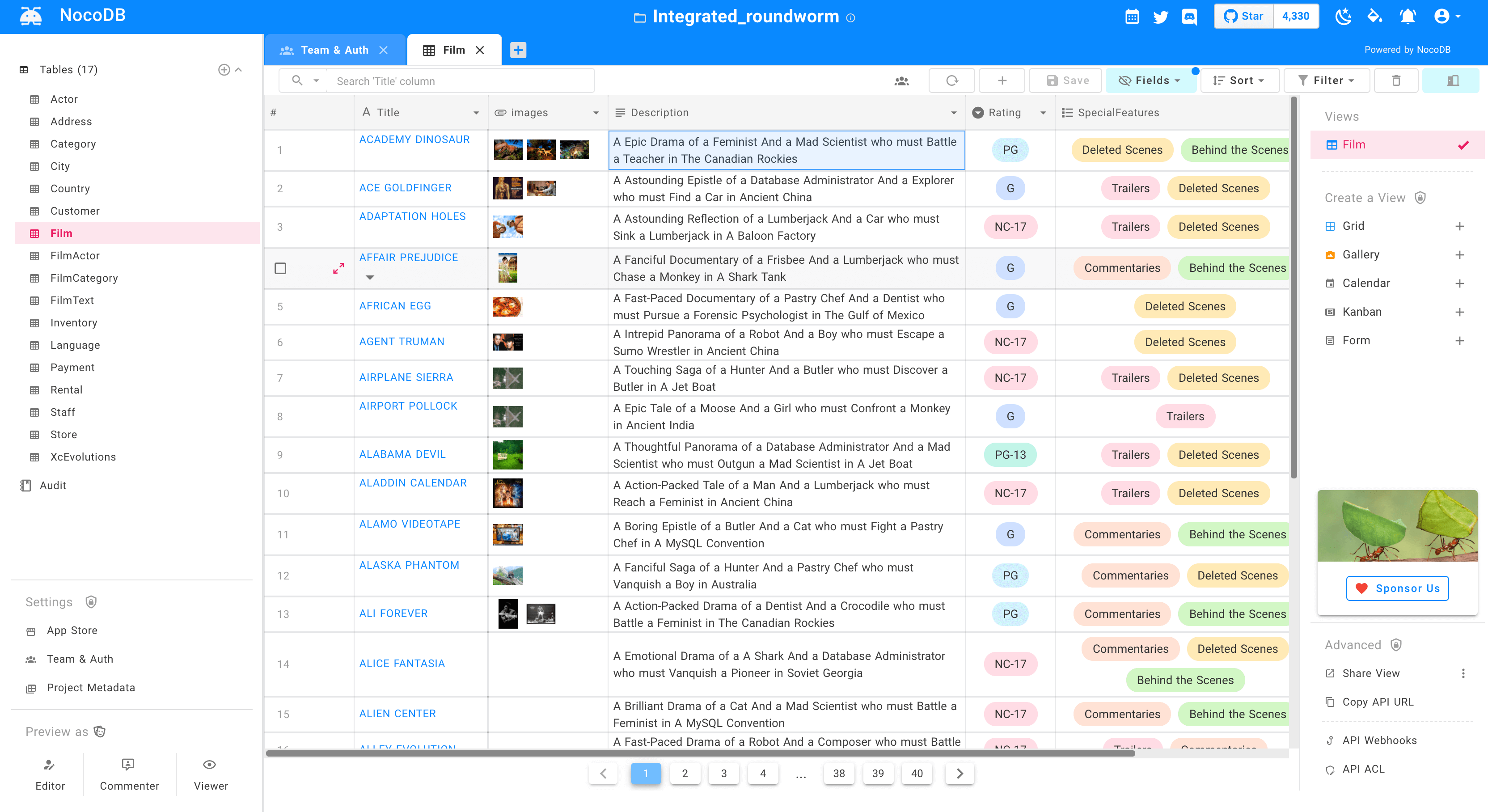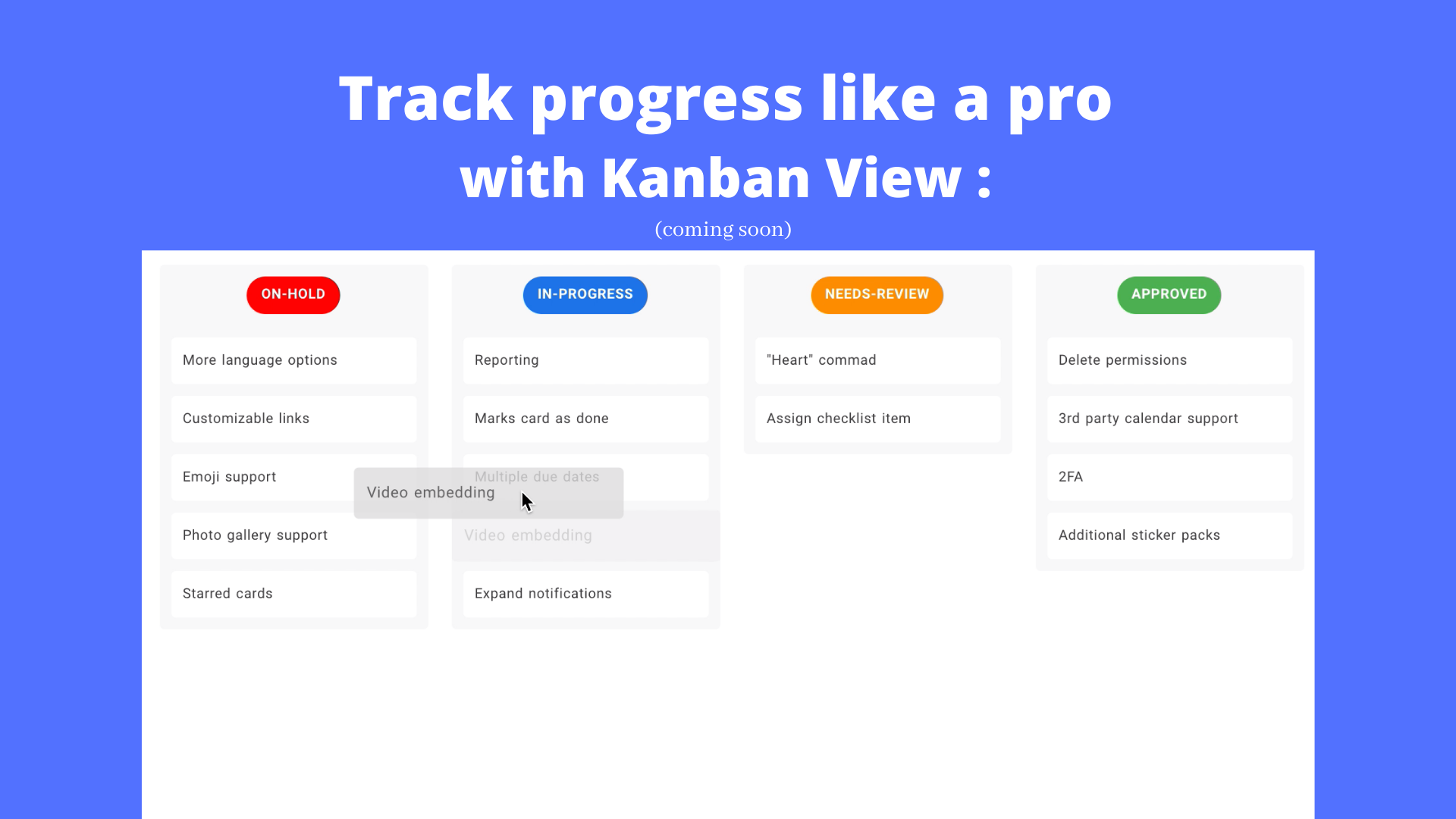|
|
3 years ago | |
|---|---|---|
| .github | 3 years ago | |
| .run | 3 years ago | |
| docker-compose | 3 years ago | |
| packages | 3 years ago | |
| scripts | 3 years ago | |
| .all-contributorsrc | 3 years ago | |
| .gitignore | 3 years ago | |
| LICENSE | 4 years ago | |
| README.md | 3 years ago | |
| Run.md | 3 years ago | |
| lerna.json | 4 years ago | |
| package-lock.json | 3 years ago | |
| package.json | 3 years ago | |
README.md
NocoDB
The Open Source Airtable Alternative
Turns any MySQL, PostgreSQL, SQL Server, SQLite & MariaDB into a smart-spreadsheet.
Website • Discord • Community • Twitter • Reddit • Documentation


Quick try
1-Click Deploy to Heroku
Before doing so, make sure you have a Heroku account. By default, an add-on Heroku Postgres will be used as meta database. You can see the connection string defined in DATABASE_URL by navigating to Heroku App Settings and selecting Config Vars.
NPX
You can run below command if you need an interactive configuration.
npx create-nocodb-app

Node Application
We provide a simple NodeJS Application for getting started.
git clone https://github.com/nocodb/nocodb-seed
cd nocodb-seed
npm install
npm start
Docker
# for SQLite
docker run -d --name nocodb \
-v "$(pwd)"/nocodb:/usr/app/data/ \
-p 8080:8080 \
nocodb/nocodb:latest
# for MySQL
docker run -d --name nocodb-mysql \
-v "$(pwd)"/nocodb:/usr/app/data/ \
-p 8080:8080 \
-e NC_DB="mysql2://host.docker.internal:3306?u=root&p=password&d=d1" \
-e NC_AUTH_JWT_SECRET="569a1821-0a93-45e8-87ab-eb857f20a010" \
nocodb/nocodb:latest
# for PostgreSQL
docker run -d --name nocodb-postgres \
-v "$(pwd)"/nocodb:/usr/app/data/ \
-p 8080:8080 \
-e NC_DB="pg://host.docker.internal:5432?u=root&p=password&d=d1" \
-e NC_AUTH_JWT_SECRET="569a1821-0a93-45e8-87ab-eb857f20a010" \
nocodb/nocodb:latest
# for MSSQL
docker run -d --name nocodb-mssql \
-v "$(pwd)"/nocodb:/usr/app/data/ \
-p 8080:8080 \
-e NC_DB="mssql://host.docker.internal:1433?u=root&p=password&d=d1" \
-e NC_AUTH_JWT_SECRET="569a1821-0a93-45e8-87ab-eb857f20a010" \
nocodb/nocodb:latest
To persist data in docker you can mount volume at
/usr/app/data/since 0.10.6. Otherwise your data will be lost after recreating the container.
If you plan to input some special characters, you may need to change the character set and collation yourself when creating the database. Please check out the examples for MySQL Docker.
Docker Compose
We provide different docker-compose.yml files under this directory. Here are some examples.
git clone https://github.com/nocodb/nocodb
# for MySQL
cd nocodb/docker-compose/mysql
# for PostgreSQL
cd nocodb/docker-compose/pg
# for MSSQL
cd nocodb/docker-compose/mssql
docker-compose up -d
To persist data in docker, you can mount volume at
/usr/app/data/since 0.10.6. Otherwise your data will be lost after recreating the container.
If you plan to input some special characters, you may need to change the character set and collation yourself when creating the database. Please check out the examples for MySQL Docker Compose.
GUI
Access Dashboard using : http://localhost:8080/dashboard
Join Our Community


Screenshots
Table of Contents
- Quick try
- GUI
- Join Our Community
- Screenshots
- Table of Contents
- Features
- Production Setup
- Development Setup
- Contributing
- Why are we building this?
- Our Mission
- Contributors
Features
Rich Spreadsheet Interface
- ⚡ Basic Operations: Create, Read, Update and Delete on Tables, Columns, and Rows
- ⚡ Fields Operations: Sort, Filter, Hide / Unhide Columns
- ⚡ Multiple Views Types: Grid (By default), Gallery and Form View
- ⚡ View Permissions Types: Collaborative Views, & Locked Views
- ⚡ Share Bases / Views: either Public or Private (with Password Protected)
- ⚡ Variant Cell Types: ID, LinkToAnotherRecord, Lookup, Rollup, SingleLineText, Attachement, Currency, Formula and etc
- ⚡ Access Control with Roles : Fine-grained Access Control at different levels
- ⚡ and more ...
App Store for Workflow Automations
We provide different integrations in three main categories. See App Store for details.
- ⚡ Chat : Slack, Discord, Mattermost, and etc
- ⚡ Email : AWS SES, SMTP, MailerSend, and etc
- ⚡ Storage : AWS S3, Google Cloud Storage, Minio, and etc
Programmatic Access
We provide the following ways to let users to invoke actions in a programmatic way. You can use a token (either JWT or Social Auth) to sign your requests for authorization to NocoDB.
- ⚡ REST APIs
- ⚡ NocoDB SDK
Sync Schema
We allow you to sync schema changes if you have made changes outside NocoDB GUI. However, it has to be noted then you will have to bring your own schema migrations for moving from environment to others. See Sync Schema for details.
Audit
We are keeping all the user operation logs under one place. See Audit for details.
Production Setup
By default, SQLite is used for storing meta data. However, you can specify your own database. The connection params for this database can be specified in NC_DB environment variable. Moreover, we also provide the below environment variables for configuration.
Environment variables
Please refer to Environment variables
Development Setup
Cloning the Project
git clone https://github.com/nocodb/nocodb
cd nocodb
Running Backend locally
cd packages/nocodb
npm install
npm run watch:run
# open localhost:8080/dashboard in browser
Running Frontend locally
cd packages/nc-gui
npm install
npm run dev
# open localhost:3000/dashboard in browser
Changes made to code automatically restart.
nocodb/packages/nocodb includes nc-lib-gui which is the built version of nc-gui hosted in npm registry. You can visit localhost:8000/dashboard in browser after starting the backend locally if you just want to modify the backend only.
Running Cypress tests locally
# install dependencies(cypress)
npm install
# run mysql database with required database using docker compose
docker-compose -f ./scripts/docker-compose-cypress.yml up
# Run backend api using following command
npm run start:api
# Run frontend web UI using following command
npm run start:web
# wait until both 3000 and 8080 ports are available
# and run cypress test using following command
npm run cypress:run
# or run following command to run it with GUI
npm run cypress:open
Contributing
Please refer to Contribution Guide.
Why are we building this?
Most internet businesses equip themselves with either spreadsheet or a database to solve their business needs. Spreadsheets are used by a Billion+ humans collaboratively every single day. However, we are way off working at similar speeds on databases which are way more powerful tools when it comes to computing. Attempts to solve this with SaaS offerings has meant horrible access controls, vendor lockin, data lockin, abrupt price changes & most importantly a glass ceiling on what's possible in future.
Our Mission
Our mission is to provide the most powerful no-code interface for databases which is open source to every single internet business in the world. This would not only democratise access to a powerful computing tool but also bring forth a billion+ people who will have radical tinkering-and-building abilities on internet.












